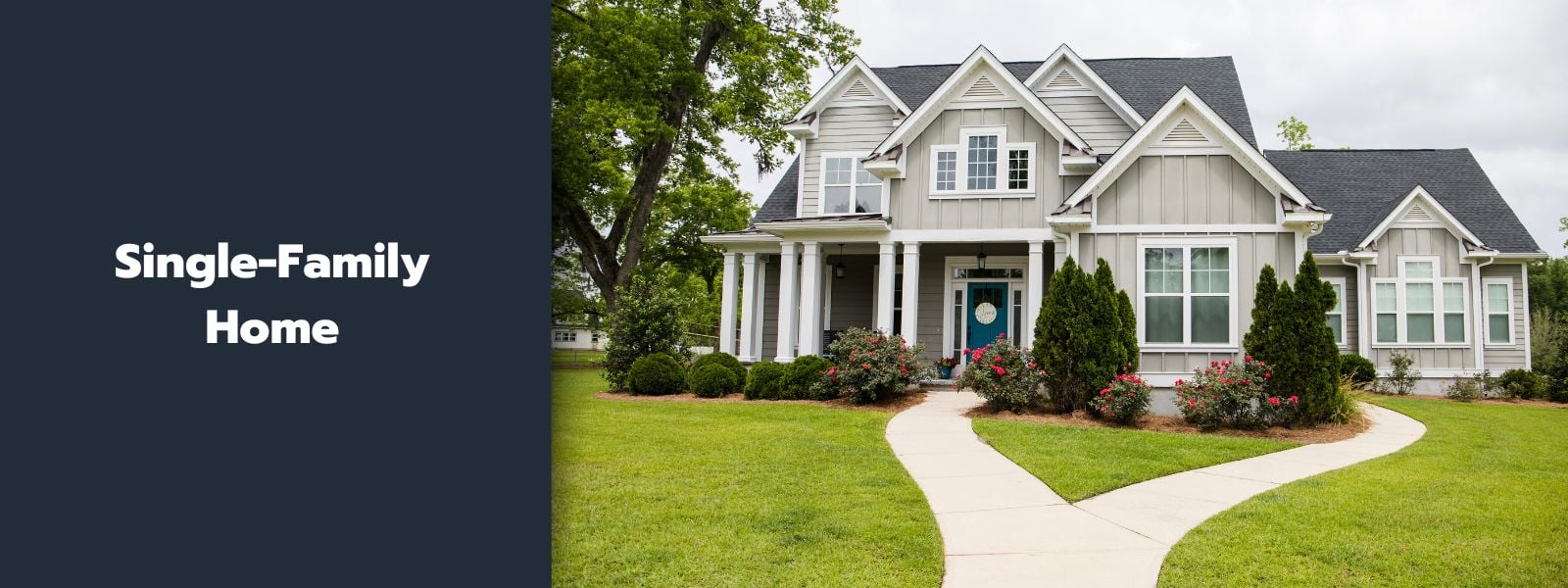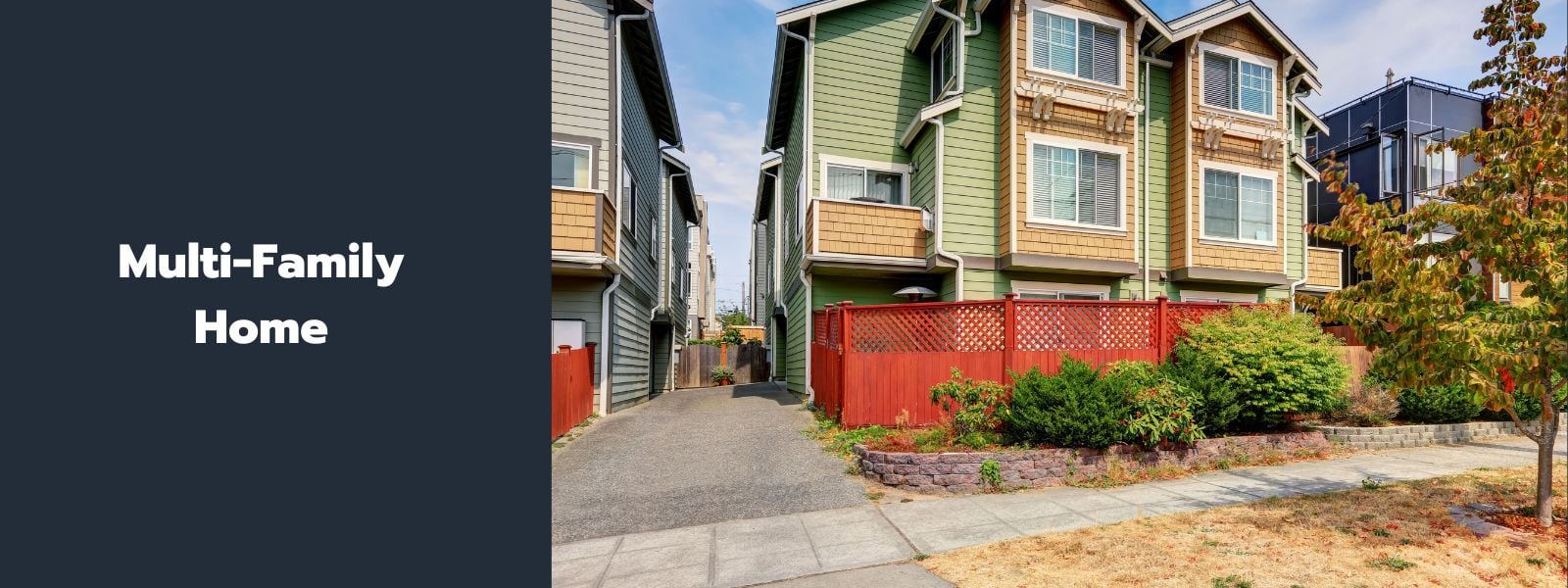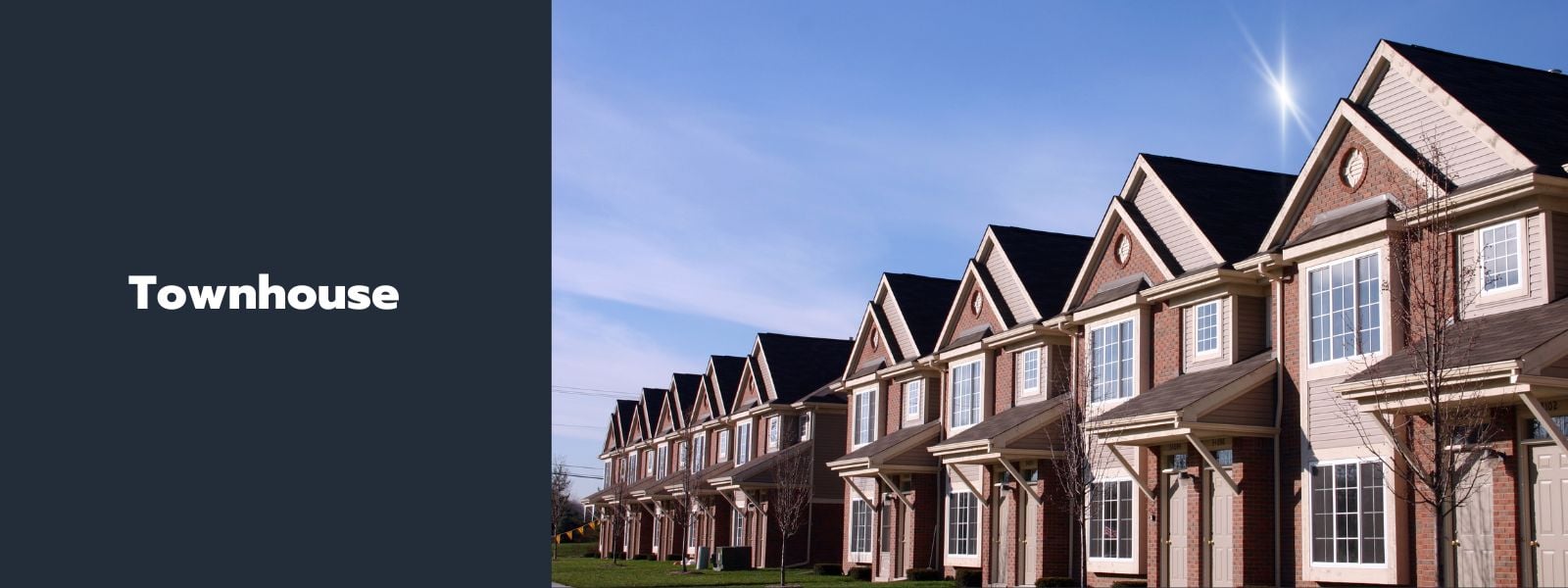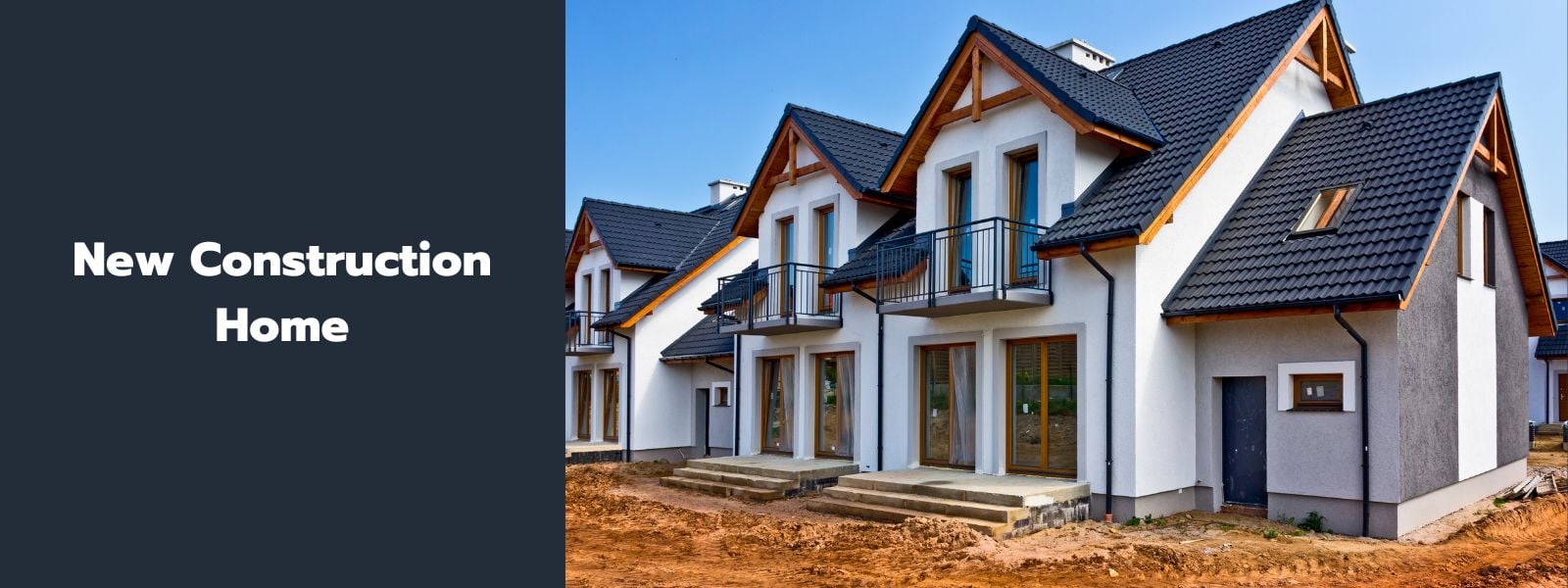When you’re in the market to buy a home, the options can feel overwhelming.
Do you picture yourself in a classic single-family home, or are you leaning toward the low-maintenance lifestyle of a condo?
Maybe a townhouse or a multi-family property is a better fit for your goals.
Deciding what kind of house to buy involves more than just location and price—it requires careful consideration of your lifestyle, financial situation, and future plans.
In this guide, we’ll break down the pros and cons of different types of homes, along with how to finance each, to help you find the perfect fit for your needs and budget.

Single-Family Home
Best For: Those who prioritize privacy and want to customize their living space
A single-family home is a separate property that does not share walls, a roof, doors, or land with any other unit. It is designed specifically for one family or individual.
While some single-family homes may be part of a homeowners association (HOA), owners are typically responsible for maintaining the home and its surrounding land.
Pros
- Privacy: A single-family home sits on its own piece of land, providing distance from neighbors.
- Customization: Homeowners have the freedom to alter both the home and the property, as long as these changes comply with local zoning laws and any HOA regulations.
- Extra Storage: These homes often feature additional storage options, such as attics, basements, and spare closets.
Cons
- Higher Price: Single-family homes are generally more expensive than other housing options, leading to larger mortgage payments and increased costs of homeownership, including down payments, property taxes, and homeowners insurance.
- Potentially High Maintenance Costs: Owners are responsible for maintaining the home and the land, which can significantly add to overall homeownership expenses.
- No Shared Amenities: Unlike many apartments or condos, single-family homes typically lack community features such as pools and gyms.
How to Pay for It
Most mortgage programs—such as conventional loans and government-backed options like FHA loans—can assist you in purchasing a single-family home.
Finding the right mortgage can be overwhelming, but our realtors are here to help. Give us a call to speak with one of our agents.

Multi-Family Home
Best For: Those Seeking an Investment Property
A multi-family home is a single building that contains several separate living units. This can include structures like duplexes or small apartment buildings. Each unit typically has its own kitchen and bathroom, while residents generally share walls, a roof, laundry facilities, and outdoor space.
Pros
- Rental Income: These properties are often owned by an individual who lives in one unit and rents out the others. Owning the building allows you to generate rental income, which can help offset your mortgage costs.
- Ideal for Multigenerational Families: This is an excellent option if you want to live near family members while still having your own space.
Cons
- Less Privacy Compared to Single-Family Homes: Sharing walls, a roof, and outdoor areas means you may hear your neighbors more often and encounter them regularly.
- Potential for Vacancies: While owning the building offers benefits, you might face temporary vacancies that can impact your finances. It’s crucial to have emergency savings for these situations.
How to Pay for It
If a multi-family home has up to four units, it’s classified as a residential property for financing purposes. This means you can purchase it with the same types of mortgages available for single-family homes, including both conventional and government-backed loans.

Condo
Best for: Those who want to enjoy shared services and amenities without dealing with home maintenance.
A condo, or condominium, is a private unit located within a larger building or property. Residents often share amenities such as a laundry room, swimming pool, dog-walking area, and fitness center.
A condo association collects monthly fees from residents, using these funds to maintain the property and shared spaces.
Pros
- Affordability: Condos tend to be less expensive than single-family homes.
- Shared amenities: Many condo associations offer various amenities and social events, providing opportunities to connect with neighbors.
- Security: Some condo associations may hire security personnel to patrol the grounds, enhancing neighborhood safety.
Cons
- HOA fees: While the cost of a condo unit is generally lower than that of a single-family home, residents usually pay monthly fees that can range from a few hundred dollars to over a thousand.
- Restrictions: Condo associations typically impose rules that residents must follow.
- Potentially harder to sell: Because condo living may not suit everyone, you might face a limited number of interested buyers when selling your property.
How to pay for it
You can finance a condo through conventional loans, FHA condo loans, or VA condo loans. However, qualifying may be more challenging compared to a single-family home, as lenders will evaluate the health of the condo project in addition to your financial situation.
Details vary among mortgage programs, so consult a lender for guidance on your options.

Townhouse
Best if: You want the amenities of a condo but also prefer to own the land on which the townhouse stands.
A townhouse is a unit within a multi-unit property, typically consisting of several floors and often including a garage and a small yard.
Residents usually share walls and a roof, and there may also be shared community spaces, such as pools, dog-walking areas, and fitness centers. A monthly fee is paid to the homeowners association (HOA) to cover maintenance costs.
Pros
- Amenities: Townhouse residents often have access to shared amenities like pools, gyms, and dog-walking areas.
- Land ownership: If the townhouse includes a yard, you’ll own the land. Plus, the HOA may handle landscaping and pest control.
Cons
- Less privacy: Sharing walls and backyard space with neighbors means there is typically less privacy compared to a single-family home.
- Restrictions: Residents usually must adhere to the rules set by the HOA. This may include obtaining permission for major renovations, following guidelines for exterior decoration, and potential restrictions on pet ownership.
How to pay for it
You can purchase a townhouse using a conventional loan or a government-backed mortgage. However, the lender may need to assess the financial stability of the homeowners association.

New Construction Home
Best for: Those who want to customize a brand-new dwelling
A new construction home is exactly what it sounds like: a brand-new home built to the latest standards. You can either buy your own land and hire a builder to create a customized home, or choose a move-in-ready home from a builder’s available designs.
Pros
- Control over the process: Depending on the builder, you might have the option to customize everything—from the size and layout of the home to the materials used.
- No bidding wars: You won’t need to worry about competing with other buyers or submitting multiple offers, which is especially advantageous in a market with limited inventory.
- New materials: Newer homes are usually more energy-efficient and constructed to meet current building codes. Since everything is brand-new, you can avoid the repairs or replacements often needed with a fixer-upper.
Cons
- Waiting period: Building a new home typically takes about seven months, so you’ll need to find temporary housing and may need to communicate with the builder during this time.
- Unexpected costs: It’s wise to budget for unexpected expenses and price increases that could raise your overall home cost.
- No negotiating: Builders often set prices, which can limit your ability to negotiate.
How to pay for it
There are two main ways to finance the purchase of a new construction home:
- Use a construction loan to finance the building process.
- Take out a traditional home loan to buy a new construction home.
Learn More: Pros & Cons of Buying a New Construction Home in Texas

Co-op
Best if: You’re buying in a large city
When you buy a co-op, you’re not actually purchasing a piece of property. Instead, you become a shareholder in a corporation that owns a multi-unit building. Your shares allow you to lease one of the units.
Co-ops are especially popular in urban areas like Washington, D.C., and New York City, and they require a monthly maintenance fee for upkeep.
Pros
- More options: In some large cities, co-ops offer an affordable alternative to condos and townhomes.
- Participation: As a shareholder, you have a voice in how the building or complex is managed, even if you’re not on the board.
Cons
- Tough approval process: You will need to undergo an interview with the co-op board, which will ask about your job, hobbies, lifestyle, and plans for renovations. When you eventually sell your co-op shares, finding a suitable buyer who meets the board’s criteria can be challenging.
- Rules and regulations: You must follow the co-op’s rules, which may restrict anything from remodeling your unit to renting out your property.
How to pay for it
You won’t use a traditional mortgage to buy a co-op since you don’t actually own your unit. Instead, you’ll need to find a bank or lending institution that offers “co-op loans” or “share loans,” which allow you to purchase shares in the cooperative.
Typically, the lender will want to assess the financial health of the co-op and review how it operates.

Questions to Ask Yourself When Choosing a Home
Every type of home has its own advantages and disadvantages. To determine which option is best for you, consider these questions:
1. How much space do I need?
If you require ample space for a growing family (or a pet), look into single-family homes or townhouses. These options generally provide more room, as they often come with a yard and a garage. However, it’s wise to compare square footage, as some condos may offer more space than nearby single-family houses.
2. Do I want the freedom to renovate?
Living in a single-family home typically gives you more flexibility to personalize your space, but if it’s within a homeowners association (HOA), you may need to adhere to certain rules about exterior maintenance. In contrast, condos, co-ops, and townhouses often have stricter HOA regulations regarding modifications.
3. Am I willing to pay additional fees?
Residents in co-ops, condos, and townhouses usually pay a monthly fee that covers various services. These services can vary significantly between HOAs, including utilities, landscaping, pest control, pools, gyms, parks, playgrounds, and other amenities. Monthly fees can range from a few hundred dollars to over $1,000.
4. Will I want to refinance in the future?
Even if you feel you got a great deal on your mortgage, it’s smart to look for potential savings down the line. Refinancing a single-family home, condo, or townhouse is generally straightforward: you’ll apply for a new mortgage, pay off the original loan, and gradually pay down the new loan.
Homeowners commonly refinance to save money or access cash. However, refinancing a co-op can be more complex, as it requires finding a lender that offers co-op refinance loans and obtaining approval from the co-op board.
5. How much can I afford?
Getting pre-approved for a mortgage is one effective way to determine your budget for a home. During this process, a lender will review your credit history, bank statements, and income to assess how much you can afford to spend on housing each month.
Keep in mind that single-family homes, new constructions, and multi-family properties may be more expensive than condos. If you decide to purchase a condo, be sure to factor any HOA fees into your budget.

Key Takeaways: What is PMI & Why Does it Matter?
Choosing the right home is a personal decision that depends on many factors, from your space requirements to your financial capabilities and lifestyle goals.
Whether you opt for a single-family home with room to grow, a multi-family property that generates rental income, or a low-maintenance condo, the key is to align your choice with your long-term plans.
By carefully weighing the pros and cons of each option and asking the right questions, you can feel confident that you’re making a smart investment in your future.
No matter what type of home you choose, being informed and prepared will make the home-buying process smoother and more rewarding.
If you’re ready to get started, Helen Painter Group Realtors is here to offer our expertise and local knowledge.
A long-standing and trusted Fort Worth real estate agency, we’ve been serving buyers and sellers since 1958.
With over six decades of success behind us, you’ll surely have peace of mind knowing your best interests are being represented each step toward buying or selling a home.
To learn more or speak with an agent, feel free to give us a call at (817) 923-7321 or contact us.

